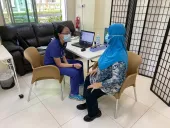
Consumerism drives healthcare transformation amidst tech advancements
Consumers’ changing perspectives towards healthcare have led providers to adopt new care models and technologies.
AS consumerism grows, so has healthcare adopted a consumer-centric approach to the services and options they lay out for patients.
During the Healthcare Asia Summit held in Singapore, Alex Bolton, a partner at Bain & Company, leaned on providing convenience, quality, and proactive management — not forgetting that patients are still consumers who demand for good services and interactions.
“Healthcare has historically been a service, an infrastructure, somewhat like your telco and so on. You kind of have to go get it done. That’s changed. It’s been thrown out the window. Now, healthcare is a consumer product for many people in the market,” Bolton said during his keynote address.
As a response to this shift, more healthcare providers, including hospitals, specialist centres, and so on, are adopting new models for patient care.
“We’re seeing the rise of general practitioner (GP) primary care clinics, care being delivered inside pharmacies and homes, and then even into your pockets with digital health and the surrounding ecosystem that it provides,” Bolton said.
About half of those they surveyed were willing to spend more on healthcare than in the past, with an emphasis on prevention, wellness and more data access, he said.
“They want their medicine to come in two hours to their house, and they are not happy to make an appointment at a doctor's office and then sit and wait 45 minutes to go and see a doctor,” Bolton said. “We’ve been putting the patient first, now we need to put the customer first. Reinvent the customer journey.”
Technology and innovation
Technology and innovation have also played a crucial role in healthcare’s transformation with a shift towards digital health solutions.
“We’re at this tipping point of really strong demand and constrained supply, and the fact that we are moving towards an environment where we need to be careful with how technology gets put in between care pathways,” Bolton said.
He noted that the current landscape is at a crucial point where technology revolution plays a pivotal role.
“Traditionally healthcare has been delivered inside the walls of a hospital in many of these markets where the scarce supply of doctors have holed up and set their battle lines, so to speak. That's changing and digital has accelerated that,” he said.
In line with this, telemedicine has increasingly integrated itself into offline healthcare provision as its usage persists.
Though Singapore has shifted their sentiments towards the traditional GP experience, emerging markets like India, and Indonesia, showed a strong prevalence of digital openness.
“In emerging markets like India, and Indonesia, you see a really strong prevalence of digital openness,” Bolton mentioned.
Moreover, he reiterated that this digital openness doesn't imply an exclusive choice between digital and traditional methods, rather emphasising the need for integration and omnichannel strategies.
Bolton also noted the growing public acceptance of AI-driven healthcare solutions indicated trust in the technology to supplement and enhance human medical practices.
“There's still a meaningful share of people that are a bit cautious, but I think, given that you only have around 20% of people saying, ‘I’m open to telemedicine,’ back in 2019, this is such a huge cultural shift in terms of openness towards technology,” he added.













 Advertise
Advertise













